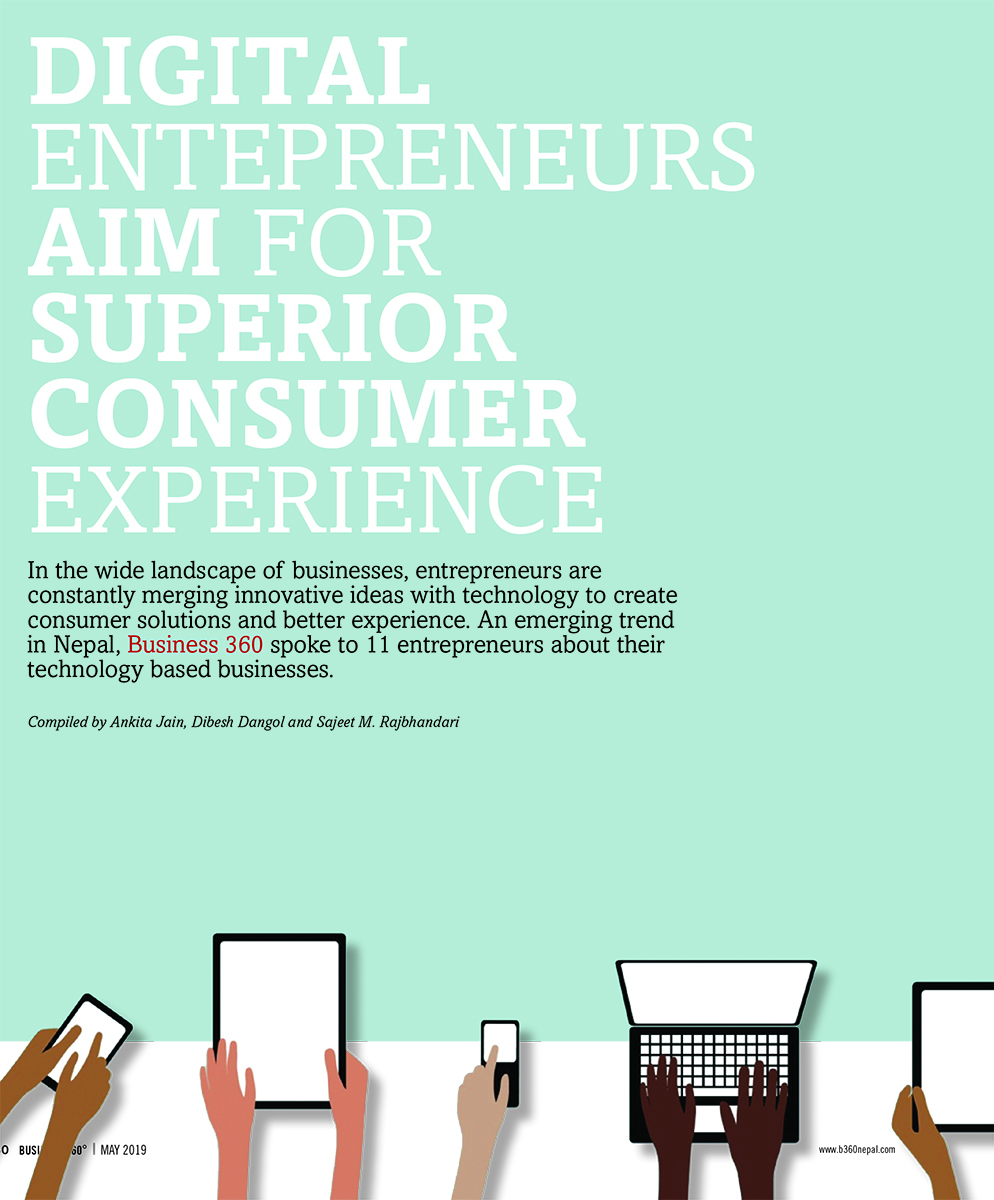
In the wide landscape of businesses, entrepreneurs are constantly merging innovative ideas with technology to create consumer solutions and better experience. An emerging trend in Nepal, Business 360 spoke to 11 entrepreneurs about their technology based businesses.
Compiled by Ankita Jain, Dibesh Dangol and Sajeet M. Rajbhandari
Anil Basnet
Metrotarkari

As an IT professional, Anil Basnet always wanted to create a platform which would contribute to socio-economic change. In 2012, Basnet tried his luck at merging technology with everyday needs. “I am the kind of person who wants everything at his fingertips and grocery shopping was something I wasn’t too keen about. To make life easier for people like myself, I came up with the idea of metrotarkari.com,” he recalls. His initiative is the first of its kind as an online Nepali grocery company. Today, Metrotarkari not only works on the demand side but also on the supply side. “Through our various in-field programs, farmers have been now oriented to produce non-pesticide vegetables and are given a platform to sell their products at the best price possible,” he claims. Assuring consumers better, hygienic and safer produce, Metrotarkari is positioned for its reliability and convenience.
Minesh Rajbhandari
Cheers Enterprise
Minesh Rajbhandari, along with four co-founders, started Cheers in 2016 with the idea of tapping into the growing trend of online shopping in Nepal. They started with a product that no other online company had penetrated – liquor. “Liquor is highly standardised, meaning that a bottle of any brand of alcohol will be the same no matter which corner of the world you buy it from. This doesn’t require touch-and-feel before buying and is easier to sell online,” says Rajbhandari.
Since its inception, Cheers has been operating 365 days from 10 am to 10 pm and serving thousands of customers via their website, app, and dedicated call centre with an average delivery time of 37 minutes. “Our target customers are those who have a very busy schedule and do not have time to go to the beer and wine shop and also those with impromptu plans,” shares Rajbhandari. It’s clearly evident from its growing popularity that this business is working!
Dr Bishal Dhakal
Health At Home

Health At Home, as the name suggests, is an idea which came as a solution for people who do not have to stay in the hospital for long. It is also for individuals who can avoid hospital visits for normal check-ups by having the service available at home. Started in 2009, Health At Home has spread across Nepal and also has a representative office in Delhi, India. From doctor visits to nursing care, lab on call, vaccinations, physiotherapy and pharmacy, Health At Home covers all routine medical needs.“This is a purely social enterprise solving healthcare issues and conditions,” says Dr Bishal Dhakal, Owner, Health At Home, who served as the first employee of the platform. Today there are more than 100 patients in bed needing care every day. “Our care team has expanded to more than 200 staffs who are working as full time or part-time professionals,” Dr Dhakal informs. The platform has also created alternate job market for nurses and health professionals in addition to care providers with a highly competitive pricing model making their services widely accessible.
Manohar Adhikari
Foodmandu
While working for an IT company, Manohar Adhikari struggled to organise his lunch almost every day. As an IT professional, he conceptualised an online store for food delivery. In 2010 with e-commerce marking its way into Nepal, Adhikari set the stage for Foodmandu. “In the initial days, I thought the idea of online food store would immediately flourish but I realised that creating the awareness was going to be more critical,” shares Adhikari. The first three years were crucial for Foodmandu but hugely successful today the platform has tie-ups with 350+ restaurants and cafes in the capital. “We targeted office employees in the first phase but our sales showed business coming from youngsters and residences more,” he shares. The year 2020 will find the platform in Pokhara.
Narayan Koirala
Eminence Ways
Identifying a wide gap in secure software development and deployment of secure IT infrastructure in an organisation, Narayan Koirala started Eminence Ways in 2013.“There is a huge misconception that cyber attacks occur only in larger organisations. However, any organisation, big or small, can be a victim of a cyber attack,” shares Koirala.
Eminence Ways has worked with clients from different sectors but their current primary target audience is banking and financial institutions and government agencies.“Our core services are focused on Information Systems Audit and Penetration Testing (IT Security Testing) through which we have been able to create impact in terms of reforming secure IT deployment practices in organisations. We also work towards raising IT security awareness in individuals and providing a legal platform to work for ethical hackers and IT security researchers,” says Koirala.
Shankar Uprety
Hamro Patro

When Shankar Uprety went to the USA in 2008 to study, he had taken a bhitte patro (Nepali wall calendar), which in a year expired. At that time, he also found it hard to find out what was happening in Nepal. So in 2009, he built a Nepali calendar app for iPhone which was basically for his use in the beginning. “Once I released the app, it was hugely appreciated and I started adding more features to it. I added a date converter, and then forex so that I could keep track of exchange rates to send money to Nepal,” says Uprety. In 2012, Hamro Patro was released on the Android platform as well.
Earlier their primary target was Non Resident Nepalis but now it’s for everyone. “Being out of the country is hard and people find Hamro Patro a medium to know about Nepal from current affairs to their favourite local radio channel, festivals and celebrations,” he highlights.
Kushal Harjani
Doko Recyclers
All three founders of Doko Recyclers - Kushal Harjani, Raghavendra Mahto and Runit Sari - contemplated forming a social business, a venture that would combine profit with purpose. They had either worked or studied abroad and were accustomed to recycling and segregating waste at source. Hence Doko Recyclers took shape in July 2017. Knowing there was already a market for recyclable waste, they wanted to capitalise on all the other types of dry recyclables that were otherwise ending up in landfills. “Our biggest impact would be the awareness we are raising and spreading to our communities about recycling and segregating waste,” states Harjani. So far, they have partnered with 100 institutions ranging from INGOs and educational institutions changing 20,000 people’s perceptions of waste and managing to recover and recycle a lot more in the process. “We are pioneers in professional electronic waste management and have recently launched a separate platform for e-waste recycling – www.ewastenepal.com, along with Tatwa - Doko’s creative upcycling range for materials that are harder to recycle or have better use being re-purposed,” claims Harjani. Over the last year, Doko Recyclers claims that it has recycled approximately 250 tons of waste through which they have saved around 1900 trees and over a million liters of water..
Atulya Pandey
Pagevamp

Pagevamp came to life as a way for a couple of university roommates to earn extra pocket money without having to make any solid investments. Atulya Pandey and his friends started by designing web pages for small businesses in Philadelphia. While doing this, they realised that most small businesses lack the time and skill to keep their website updated. However, they also came to find that these very businesses were pretty active on Facebook. Putting two and two together, the group came up with a way for businesses to automatically update web content every time they post something on their Facebook pages. Hence, Pagevamp came into existence. As their page states: ‘Pagevamp is the easiest and fastest way to create a professional website that amplifies your presence online and drives your business’. It has partnered with a multitude of restaurants and startups in Kathmandu as well as much bigger companies such as Coca-Cola and UberEats. “We are building tech that is accessible to everyone. Anybody can sign-up to Pagevamp. We look at ourselves as a self-help product,” shares Pandey.
Ekta Golchha
Delta Tech
Based in Biratnagar, Delta Tech is a software company that’s dedicated itself to providing digital solutions to corporate problems. While it started out as a software and website development company, the team at Delta Tech realised the potential that sales automation could have in an industrially growing country like Nepal. They launched a salesforce automation application called the DeltSalesApp and an inventory management app called the DeltaInventory. Ideal for both large and small businesses alike, Delta Tech strives to make the domestic business scene more efficient and economic with the use of automation. Ekta Golchha, Co-Founder and Director, Delta Tech, states that the company is working to bring out more products that cater to the business needs of both local and international businesses. She shares, “Delta Tech is coming up with its CRM (customer relationship management) application to take it to the next level.”
Sujeet Regmi
Sajilo Marmat Sewa

Sajilo Marmat Sewa was designed to provide consumers a reliable and hassle free experience when it came to household maintenance. As an MBA student, Sujeet Regmi always wanted to become a job provider and not a job seeker, he recalls. “During our graduation, we studied the current needs of the Nepali market and we found that there was a big gap between handymen and people looking for maintenance services. Seeing this, we decided to act as a medium that made it easier for people to get services they needed and the service providers to get clients,” he states. Almost two years sinceits inception in 2017, Sajilo Marmat Sewa has been able to serve over 6,500 satisfied customers with more than 150 service providers on their list. With a vision to make blue collar jobs just as dignified as white-collar counterparts, Sajilo Marmat Sewa has become one of the most efficient and reliable ways to get maintenance in the city.
Prabodh Siwakoty
Marching Ants
Prabodh Siwakoty came up with the idea of Marching Ants when he went for Digital and Analytics Summer School at Imperial College, London while pursuing his MBA degree in Business Analytics from BML Munjal University, India. There he studied and learned how digital marketing and data science has changed the landscape of brand marketing and how big companies like BMW, Patagonia, Coca-Cola, British Airways, took the brand to the next level using these tools. Siwakoty wanted to implement this solution in Nepal. After returning home, he started Marching Ants, an agency providing digital marketing and analytics solution. “At first, the clients were very sceptical about spending on digital mediums. But, for those who believed in us and have been working with us, they know the kind of impact we have brought to their businesses by delivering best results at lowest cost possible,” shares Siwakoty.












